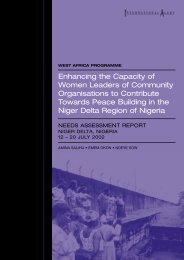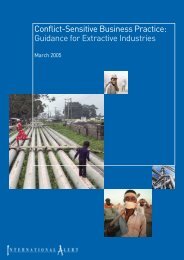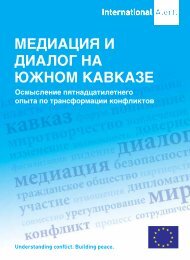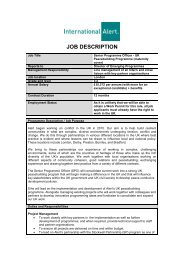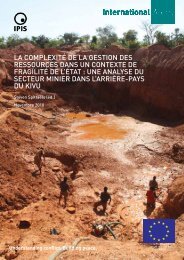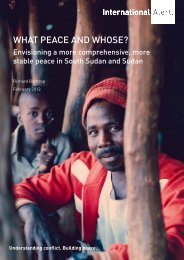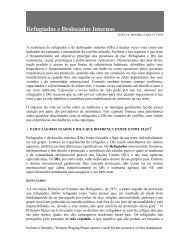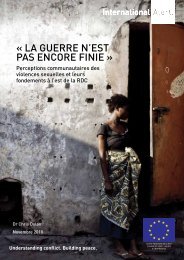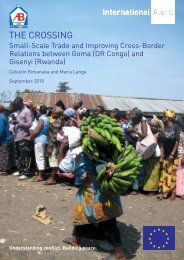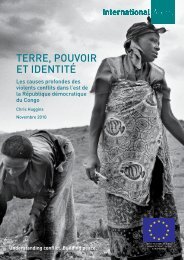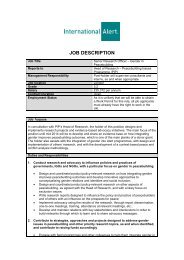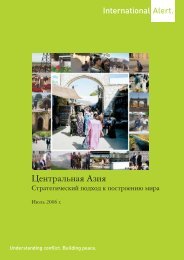The complexiTy of resource governance in a conTexT of sTaTe ... - Ipis
The complexiTy of resource governance in a conTexT of sTaTe ... - Ipis
The complexiTy of resource governance in a conTexT of sTaTe ... - Ipis
Create successful ePaper yourself
Turn your PDF publications into a flip-book with our unique Google optimized e-Paper software.
62 International Alert<br />
<strong>in</strong>itiatives exist, no new data is gathered and consequently no up-to-date maps are currently<br />
be<strong>in</strong>g published.<br />
• F<strong>in</strong>ally, as certification is established – a process that could take several years – a thorough<br />
oversight mechanism should be established to carry out <strong>in</strong>vestigations and to conduct spot<br />
checks. A credible third party oversight mechanism would be <strong>in</strong>dependently funded and would<br />
<strong>in</strong>clude a partnership with the Congolese government, which should designate an <strong>in</strong>stitution<br />
that would be <strong>in</strong> charge <strong>of</strong> sanction<strong>in</strong>g <strong>in</strong>dividuals.<br />
<strong>The</strong> situation is probably the most serious <strong>in</strong> Bafwasende, where FARDC pr<strong>of</strong>its from its<br />
<strong>in</strong>volvement <strong>in</strong> the m<strong>in</strong>eral trade (alongside ivory and bushmeat). In both Bafwasende and<br />
Mambasa, there have been reports <strong>of</strong> serious human rights violations by the FARDC. <strong>The</strong> Mayi<br />
Mayi <strong>of</strong> Major Luc, the FARDC’s opponents, are engaged <strong>in</strong> m<strong>in</strong><strong>in</strong>g and poach<strong>in</strong>g, but there are<br />
no reports <strong>of</strong> widespread human rights abuses from the (remote) area they control.<br />
Thorough DDR and SSR are absolutely essential to improve security <strong>in</strong> the m<strong>in</strong><strong>in</strong>g regions <strong>of</strong> the<br />
h<strong>in</strong>terland. <strong>The</strong>re is <strong>of</strong>ten no good reason for the FARDC to be deployed at a m<strong>in</strong><strong>in</strong>g site. <strong>The</strong><br />
Congolese army should aim to withdraw all soldiers from m<strong>in</strong><strong>in</strong>g areas that are not under threat<br />
by armed groups. Where security forces are deployed there should be safeguards <strong>in</strong> place, such<br />
as regular visits by the army’s <strong>in</strong>spector general, a military prosecutor or <strong>in</strong>telligence <strong>of</strong>ficers. <strong>The</strong><br />
<strong>in</strong>tegrity <strong>of</strong> this controll<strong>in</strong>g body is crucial and military justice should therefore be prioritised<br />
dur<strong>in</strong>g SSR. Furthermore, to set an example and end impunity, army units and commanders<br />
should be held accountable for the crimes they have committed.<br />
A renewed DDR effort is equally important. <strong>The</strong> few armed groups that are still active have no<br />
elaborate agendas and are limited <strong>in</strong> size. It should be possible to conv<strong>in</strong>ce them to enter a full<br />
DDR program that pays sufficient attention to the re<strong>in</strong>tegration aspect. <strong>The</strong> many ex-combatants<br />
who have “self-demobilised” constitute another group which should be <strong>in</strong>cluded.<br />
Generally speak<strong>in</strong>g, among the armed groups, large pr<strong>of</strong>its are probably only made by some <strong>of</strong><br />
the FARDC units work<strong>in</strong>g for their superiors. <strong>The</strong>se units <strong>of</strong>ten establish and ma<strong>in</strong>ta<strong>in</strong> a shadow<br />
economy apart from the <strong>of</strong>ficial circuit. Furthermore it has to be kept <strong>in</strong> m<strong>in</strong>d that military <strong>of</strong>ficers<br />
sometimes have bus<strong>in</strong>ess <strong>in</strong>terests <strong>in</strong> “legitimate” economic operators such as Maniema Union.<br />
Congolese <strong>of</strong>ficials, beyond the FARDC, <strong>of</strong>ten take part <strong>in</strong> the shadow economy.<br />
Government agents <strong>in</strong> h<strong>in</strong>terland areas reveal high levels <strong>of</strong> frustration concern<strong>in</strong>g lack <strong>of</strong> <strong>resource</strong>s<br />
and support to carry out their functions. Such a lack <strong>of</strong> support <strong>of</strong>ten breeds predatory behaviour<br />
and illegal taxation practices by government agents at m<strong>in</strong>e sites. Un<strong>of</strong>ficial taxation and fees<br />
become a substitute for regular salary payments, and are <strong>of</strong>ten subsidised by m<strong>in</strong>e operators.<br />
A common assumption made by both the government and development actors is that <strong>in</strong> order to<br />
resolve the <strong>governance</strong> problems plagu<strong>in</strong>g the m<strong>in</strong><strong>in</strong>g sector, one need only <strong>in</strong>crease the number<br />
<strong>of</strong> government agents available for a site or series <strong>of</strong> sites. However, new government agents are<br />
rarely deployed with sufficient <strong>resource</strong>s to perform their duties, forc<strong>in</strong>g them to adopt the same<br />
predatory behaviour as their peers. So an <strong>in</strong>crease <strong>in</strong> personnel alone, without any accompany<strong>in</strong>g<br />
<strong>resource</strong>s and tra<strong>in</strong><strong>in</strong>g, will rarely fundamentally improve services rendered by government<br />
agents. Any attempts to improve m<strong>in</strong><strong>in</strong>g <strong>governance</strong> cannot overlook the issue <strong>of</strong> quantity versus<br />
quality (i.e. number <strong>of</strong> agents versus their capacity) and furthermore the importance <strong>of</strong> ensur<strong>in</strong>g<br />
that solutions respond accurately to the fundamental constra<strong>in</strong>ts the sector faces.<br />
F<strong>in</strong>ally, artisanal m<strong>in</strong>ers are no better <strong>of</strong>f <strong>in</strong> the h<strong>in</strong>terland areas than <strong>in</strong> the Kivus. <strong>The</strong> conditions <strong>in</strong><br />
which they work are equally bad as they receive no support from the state and the current economic<br />
operators <strong>in</strong>vest little <strong>in</strong> the social needs <strong>of</strong> their labour force. Moreover, the artisanal m<strong>in</strong>ers are<br />
rarely organised, so they have virtually no barga<strong>in</strong><strong>in</strong>g power when it comes to m<strong>in</strong>eral pric<strong>in</strong>g.<br />
<strong>The</strong> establishment <strong>of</strong> artisanal and trader representation groups (whether cooperatives, associations,<br />
or others) would make an important contribution to the evolution <strong>of</strong> better <strong>governance</strong> <strong>of</strong> the<br />
sector, <strong>in</strong>clud<strong>in</strong>g its trade.



